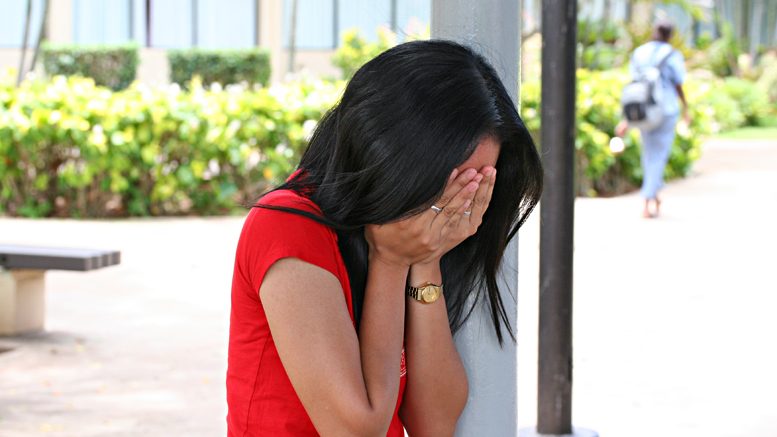Hostile School Climates as a Result of Bullying, Harassment and Discrimination Contribute to Pushing LGBTQ Students Out of School, According to New GLSEN Report
NEW YORK—Lesbian, gay, bisexual, transgender and queer (LGBTQ) students face high rates of school discipline, including detention, suspension and expulsion from school, according to a report released today by GLSEN, the leading national education organization focused on ensuring safe and affirming schools for all students. Compared to non-LGBTQ students, LGBTQ students were much more likely to have experienced each kind of discipline, often due to the harassment and discrimination that LGBTQ students face in school.
The report, Educational Exclusion: Drop Out, Push Out, and the School-to-Prison Pipeline among LGBTQ Youth, also found:
- Two in five LGBTQ students reported receiving detention, in-school or out-of-school suspension and/or expulsion from school. LGBTQ Black/African American, LGBTQ Hispanic/Latino, and LGBTQ Multiracial students; LGBTQ students experiencing homelessness; and LGBTQ students with disabilities experienced higher rates than others.
- Compared to cisgender LGBQ students, transgender students were more likely to receive school discipline and over three times as likely to report that they might not complete high school. Among LGBTQ students, the most common reason cited for not planning to graduate high school or being unsure if they would graduate was an unsupportive or hostile school environment.
- Bullying, harassment and absenteeism may contribute to high rates of discipline. Among LGBTQ students, higher levels of victimization were associated with higher rates of school discipline, potentially because bullying incidents put LGBTQ students in greater contact with school authorities. Lack of safety resulted in many LGBTQ students missing school, putting them at risk for disciplinary sanctions for truancy. Students who had missed school because of feeling unsafe or uncomfortable were more likely to have been disciplined at school than those who had not (54 percent vs. 34 percent).
- Anti-LGBTQ discriminatory policies and practices may also contribute to high rates of discipline. Over half (56 percent) of LGBTQ students experienced some form of anti-LGBTQ discrimination at school, and these students were more likely to have received school discipline than those who did not experience discrimination (48 percent vs. 32 percent). Almost one in ten students (9 percent) even reported being disciplined specifically because they were LGBTQ.
- Victimization, absenteeism and discrimination may also increase LGBTQ students’ risk of contact with the justice system. LGBTQ students who reported high levels of victimization, absenteeism or discrimination were more likely to have been involved with the justice system as a result of school discipline. The likelihood of this involvement was five times higher for LGBTQ students experiencing homelessness than for those who lived with a parent or guardian. Transgender students and LGBTQ students with disabilities were also more likely to have been involved with the justice system due to school discipline.
“It is abundantly clear that LGBTQ students face disproportionately high levels of school discipline due to hostile school climates that ultimately deprive many of them, not only of their education, but also the success in life that education affords,” said Dr. Joseph Kosciw, GLSEN’s Chief Research & Strategy Officer. “Given the findings of Educational Exclusion, we must redouble our efforts to create supportive schools for LGBTQ students, particularly transgender and gender nonconforming students, students experiencing homelessness, students with disabilities and students of color.”
In light of the report’s findings, GLSEN put forth a number of recommendations to keep LGBTQ students in school and out of the juvenile and criminal justice systems. Some of these recommendations are:
- At the school, district, state and federal levels, laws and policies should specifically protect LGBTQ students from harassment and discrimination.
- Rather than zero-tolerance policies, schools should employ graduated approaches to discipline, ensuring that disciplined students still have access to learning opportunities.
- Teachers should employ culturally responsive teaching and incorporate positive representations of LGBTQ people and topics into their curriculum.
- If School Resource/Safety Officers are used in schools, they must be trained to appropriately respond to anti-LGBTQ bias and not discriminate against LGBTQ students.
- Alternative paths to high school completion, such as GED programs, alternative schools, and education in juvenile detention centers, should be available, safe and affirming for LGBTQ youth.
- All staff should intervene when bullying occurs, in ways that do not blame the victims of bullying incidents, and consider using restorative practices rather than only punitive discipline measures.
The full Educational Exclusion report can be found at www.glsen.org/educationalexclusion.
About GLSEN
GLSEN champions safe and affirming schools for all students. We envision a world in which every child learns to respect and accept all people, regardless of sexual orientation or gender identity/expression. Each year, GLSEN programs and resources reach tens of thousands of K-12 schools across the United States, and our network of chapters brings GLSEN’s expertise to their local communities. GLSEN’s progress and impact have won support for our work at all levels of education in the United States and sparked an international movement to ensure equality for LGBTQ students and respect for all in schools. For more information on GLSEN’s policy advocacy, student leadership initiatives, public education, research and educator training programs, please visit glsen.org.
[From a News Release]







